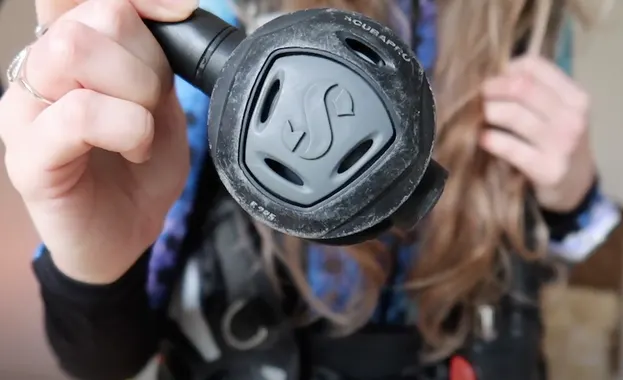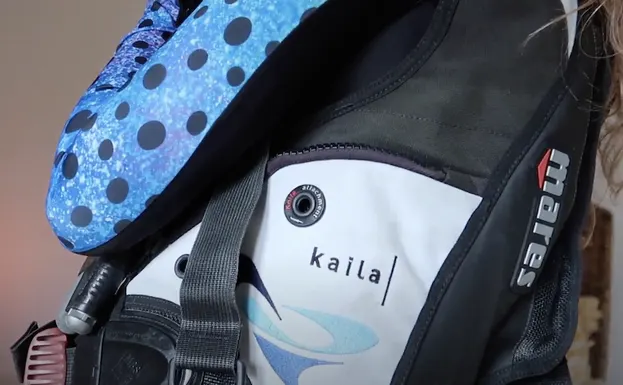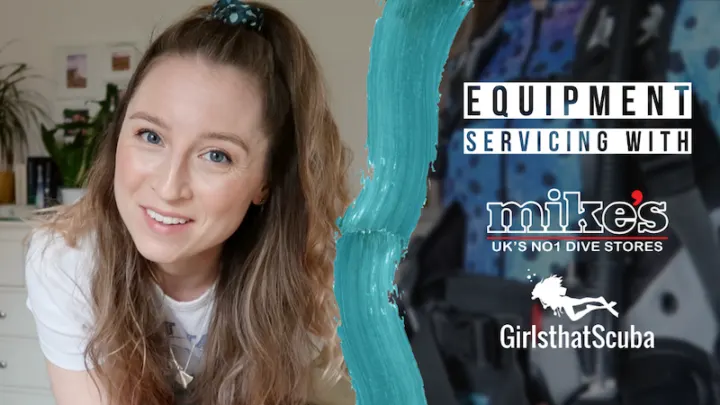The importance of servicing your scuba equipment
When we first start buying our own scuba equipment many of us treat it as our most prized possession, but lots of divers forget about the importance of servicing their scuba gear as time goes on. If you’re guilty of letting your servicing schedule slide you’re absolutely in the right place.
In collaboration with Mike’s Dive Store, we take you through the what, where, when and why of gear servicing – why you need to service your scuba equipment, how to choose the right place to get your kit serviced, and what equipment needs regular servicing.
Why should we service our dive gear?
The first and perhaps most obvious reason for why you need to service your scuba equipment frequently is safety. Your dive gear keeps you alive underwater, so in order to keep you safe it needs to function correctly. Small issues with unserviced scuba equipment don’t usually lead to catastrophic failure, but you only need to read a few stories of scuba accidents to realise that often it’s a small issue going wrong which starts the chain of much bigger problems arising. Regular servicing is a simple way to keep this risk at bay.
Getting your kit checked out frequently is also a fantastic way to support your local scuba diving store! Regular gear servicing from loyal customers can be a huge boost to a dive shop’s cash flow, so by taking your kit in for checks it means your favourite dive store will continue to be there the next time you need to buy new equipment.
As much as we all love new scuba equipment though, we know that consistently buying new things isn’t always the most sustainable practice. If you’re sticking to a good servicing timeline and maintaining your equipment well, you’re going to be able to keep it for longer and you’ll have to buy less gear in the long term. This means that ultimately your dive equipment has a little less impact on our planet, which can only be a good thing!
If you need a real life example of why it’s so important to get your equipment serviced, make sure you also check out our YouTube video where we take you through the whole servicing process. It doesn’t quite end the way you’d expect.
When do you need to service your scuba equipment?

Now that you know why you should be servicing your kit, you’re probably wondering how to tell when it’s time to send it in. The first indicator that your equipment needs servicing is that you’ve hit the manufacturer’s recommendation for when it should be checked. This will change from brand to brand and item to item; for some equipment it might be after 100 dives, for others it may be after 1 year.
However, it’s important to remember that these timelines aren’t rigid. You need to take your own diving practices into account to determine whether your equipment, particularly regulators, needs to be serviced more often. If you’re diving in cold water, excessively salty water (such as in the Red Sea), or if your equipment goes through heavy use (scuba instructors – we’re looking at you), then your equipment may need to be serviced more frequently than someone diving in warm water only a few times a year.
If you are the sort of diver who only does a few dives a year, that doesn’t exclude you from servicing. Another indication that you may want to get your equipment serviced is if it’s been in storage for a long time. Equipment which isn’t used enough can be just as likely to degrade as equipment which has been used too much, so if you’ve had an extended surface interval then it’s important to schedule in your servicing with plenty of time to spare before you get back under the water.
Have you ever purchased any dive gear second hand? If so, did you make sure to get it serviced before you went ahead and back rolled in with it? Buying used equipment can be a great way to save a few pennies, but when you’re setting a budget you should factor in the cost of getting that kit serviced once you get it. You never know how someone else has treated their equipment, and signs of wear aren’t always obvious or visible on the outside of scuba gear.
Finally, you should get your kit serviced if you notice any obvious signs of wear. This could be bubbles coming from where they shouldn’t be (hoses, first stages, gauges, BCD inflator hoses), your BCD not holding air once it’s fully inflated, your drysuit leaking, or your gauge reading incorrectly or not reading zero when the cylinder pressure is turned off. Thorough buddy checks and good buddy practices underwater (such as glancing over your buddy’s gear) are an important practice to ensure you notice any equipment problems in a timely manner.
What scuba kit needs servicing?

The first item which most divers associate with regular servicing is regulators. As these are our underwater life support and we’re breathing from them, most of us are conscious that they need to be looked after. However, a lot of divers are guilty of not keeping up with servicing on other pieces of dive equipment. The truth is, most pieces of your dive gear would benefit from being looked over by a professional.
Many of us don’t think of our BCDs as a piece of important safety equipment in the same way we do with our regulators. However, if your BCD can’t stay fully inflated at the surface, or your inflator button is at risk of getting stuck and causing a rapid ascent, is it really keeping you safe? Your BCD should be serviced according to the manufacturer’s recommendation (or sooner as we mentioned above). A thorough service means checking the inflate and deflate functions (hoses, dump valves, inflator button), ensuring it’s holding air and the bladder isn’t degraded, and disinfecting the inside of the bladder with a cleansing solution.
Dive computers are another piece of kit which we don’t always get checked as thoroughly as we should, although this does depend on which computer you have. For computers which have a battery that needs to be replaced by the manufacturer, these are generally pressure tested when the battery is replaced. However, if your computer has a user replaceable battery, it’s likely that you wouldn’t notice any issues with the dive computer until it’s too late. Dive computers can be sent in to be pressure tested which will ensure they’re reading the correct depth underwater.
If you’re a cold water diver, your drysuit has inflate and deflate functions which need to be treated the same as your BCD when it comes to servicing. These valves should be checked frequently to prevent problems arising underwater, and seals around the wrists, neck and ankles can also degrade over time. If you’re noticing consistent leaks underwater the seals should be looked at by a professional (unless they are user replaceable).
How do I choose a servicing center or dive store?
So we’ve convinced you that your gear is probably in need of a service – now how do you choose where to take it? As we mentioned before, servicing is a great way to support your local dive store, so close to home is a great place to start. Check out the reviews for their servicing (our Girls that Scuba Facebook group is a great place to ask for local recommendations) and if they’re positive then go with them and play your part in building relationships within your local dive community!
Beyond positive reviews, you also want to check that the servicing will be conducted using official service kits from the equipment manufacturer. If this isn’t clearly indicated on the website or the dive store is hesitant when you ask, it might be a sign that they’re not using the correct parts. This can cause problems with your equipment or void any manufacturer warranty you have.
Right now, we have the additional concern of maintaining social distancing when it comes to taking in our gear to be serviced. With this in mind, dive stores which offer collection and drop-off services are a great option. If you’re in the UK, Mike’s Dive Store can arrange a courier collection and return for your gear servicing to keep your whole experience contact free and safely distanced.
These safety concerns also extend to how our equipment is cleaned – check that your servicing center is using covid-safe disinfectants on mouthpieces and other parts of your gear.
Find out even more about servicing your gear and what happened when Girls that Scuba staff member Lauren sent in her 10 year old kit to be serviced
Disclaimer: This article is sponsored by Mike’s Dive Store, however all views are our own. Some links are affiliate links, which means we earn a small amount of commission if you use the link to purchase, at no additional cost to you. Brand sponsorships help us develop and grow the Girls that Scuba community and continually offer helpful and inspiring content.
When did you last get your equipment serviced? Do you have any gear servicing stories like our YouTube video? We’d love to hear from you – tag us on Instagram @girlsthatscuba or share with our Facebook community!

